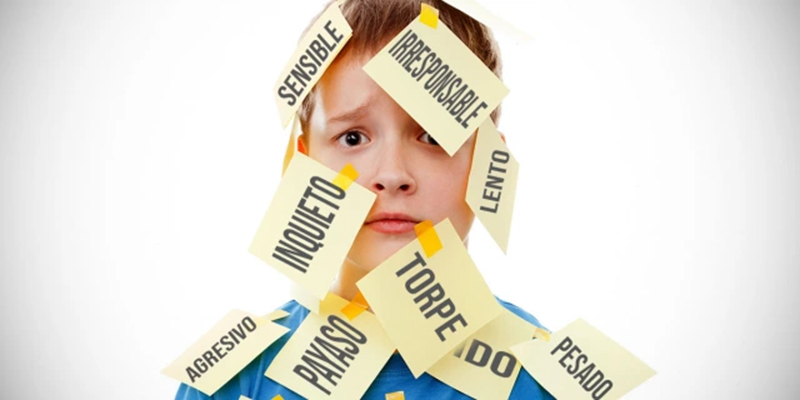
What is the danger of labeling children?
People have the tendency to label the world around us because it is useful for us to order reality and thus be able to prevent situations and respond more quickly to them. This trend extends to children. We often label children according to their behavior, for example: “you are heavy”, “you are clumsy”, “you are a whiner”, “you are very clueless”, “he is nailed to his father/mother”, etc.
Labels can be classified into three types:
- Negative labels: behaviors that are disapproved of are censored. Examples: “lazy”, “rude”, “pigeonhole”, “fat”, etc.
- Positive labels: some skill is exaggeratedly approved. Examples: “you are the best”, “you are the most handsome”, “you are the most responsible”, “you always get excellent”, etc.
- Labels with double meaning: those negative connotations but that are said with pride. That is, something that is classified as negative is valued and praised by adults. Examples: “junk”, “rogue”, “capricious”, etc.
Children interpret themselves based on what the environment says about them so they end up assuming those labels and behaving that way. This can be explained by the “Pygmalion Effect” and its self-fulfilling prophecy. This phenomenon explains that people behave taking into account the beliefs that others or ourselves have about our abilities and what we can or cannot achieve.
For example, if we consider a child more capable of doing sports or in the family that is something important, we will give him more and better stimuli in this regard, more time to practice it, etc. In this way, the child will respond by confirming our expectations by doing more sport and over time obtaining positive results. The same would happen if we label him negatively, considering that he is not good at sports and discouraging him from practicing them, in the end those expectations would probably end up being met.
Therefore, we can say that labeling children is a danger because:
- They make us forget that they are children. Certain behaviors are natural during childhood and others are not. For example, in the early years it is normal for children to be more unruly because they are discovering the world and are more curious. On the other hand, that a child worries about money because at home he has heard comments about it, can make us think that “he is responsible”, but in this case it is not a behavior typical of childhood.
- They imply generalization. Children do not behave in the same way always, however, the fact of using a label a lot makes us end up generalizing and thinking that it will behave that way in all situations and all the time and that is not possible.
- We stop seeing other behaviors. Our attention will be focused on looking for those behaviors that confirm that label and it will be harder for us to find others that are positive or that contradict that label.
- They act on those labels. As mentioned above, children act based on what is expected of them and the role assigned to them.
How do they affect their emotional development?
Labeling children obstructs parents’ and children’s abilities to experience, express, and/or recognize the whole person.
As we have said, the child will probably end up acting in the way that is expected according to his label by adopting that role. Also, we will be teaching him that as labels are rigid, his personality is also rigid so it is very difficult for him to change so he will stop trying new behaviors. However, childhood is a key stage in which it is constantly changing and the referents have a great impact enhancing or “weakening” the “natural tendencies”.
Although a priori we may think that it is negative labels that affect the development of children and affect their self-esteem, the truth is that positive labels are also dangerous and can affect them. Putting a negative label means that the child assumes that whatever he does will not be able to change his way of being and will assume that it is so and will feel bad about it. In the case of positive labels, children will be constantly trying to meet the expectations and demands of the assigned label. All this can lead to feeling frustration, insecurity or fear of not living up to what is expected. So your self-esteem can be equally affected.
What to say to motivate a child?
Although labeling is a natural and logical tendency, we must avoid pigeonholing children. The judgments we have are not absolute truths, they are subjective opinions so it is important to pay attention to the labels we usually use. The child’s environment must be as stimulating as possible in order to enhance and promote their abilities to the maximum.
To do this we must:
- Make global assessments and not based on a single trait.
- Avoid comparisons with siblings, cousins, friends, etc. Each child has his way of being and behaving.
- Define the behavior, but not the person. For example: “today you are angry” instead of “you are angry”; “You’re not doing anything today” instead of saying “You’re lazy.”
- When it does not behave as we want:
- Avoid the words “always” or “never.” For example: instead of saying “you never pick up your room, you are a disaster” we can say “pick up your room, you will surely do great”.
- Instead of saying “you’re a heavy” it is better to explain “when you want something, tell me once and I will listen to you”.
- In the same way, instead of saying “you are a crybaby” explain “if you feel bad and want to cry to feel better, nothing happens, but tell me what happens to you so we can find a solution”.
To learn more about how to get children to do what we ask you can get information in the blog “What to do when my child misbehaves?” or “Punishment and its impact on children and parents”.
Here are some general guidelines that can help you avoid using labels and maximize children’s abilities. If you have tried to put it into practice and it costs you or want to have more information about it, do not hesitate to contact our team. We will be happy to help you.
Laura Maymó Gallurt
Psychologist Col. No B-03427





